My mom was a teacher and I was educated thoroughly through public schools, so I do tend to have strong feelings about education in general and private schools specifically. I understand why wealthy parents might feel the need to send kids to elite private schools for middle school and high school – that’s when the difference between public and private schools is really notable, and you can see if your kid needs more specialized education. But I do wonder if parents are really getting their money’s worth when it comes to exclusive, private early-childhood education. Take Prince George, for example. His fancy school costs £20,000, which… seems like a lot for nap-times and drawing and kid stuff. But because fancy schools want to make it seem like you’re paying for SO MUCH, they’re making it seem like 5 and 6-year-olds are learning how to code and ballet dance.
Like children everywhere, Prince George will soon be heading back to school for the start of the new term. The five-year-old royal will next month join his classmates in Year One of the £20,000-a-year Thomas’s Battersea, south-west London. Not only will George be settling into a new classroom and meeting a new teacher, he will also be taking on new subjects like Science, History and Geography, as the curriculum becomes more challenging.
According to the school’s website, Year One pupils will build on what they learned in reception and develop key skills including joined-up handwriting, fluent speech and a greater understanding of Maths. The Duke and Duchess of Cambridge will also find themselves doing more homework with their eldest son, with pupils expected to read for 10 minutes a night and to complete a weekly spelling assignment.
George and his classmates already know some basics in French and will expand on this through learning fairy tales and songs in a weekly 35-minute class taught by a specialist teacher. They will also expand their vocabulary with winter clothes, days of the week and classroom objects.
In Religious Studies, taught by George’s Form Teacher, children will ‘develop knowledge and understanding of Christianity’ and be taught to ‘appreciate the cultural differences in Britain today’. Bible study will introduce the children to key stories including Noah, Joseph and David and Goliath.In a show of the school’s incredible facilities, George and his classmates will be given weekly Computing lessons in a dedicated suite equipped with 22 computers. There they will improve their mouse usage, be introduced to Microsoft Word and ‘develop a greater understanding of algorithms’. Outside of the classroom, George and his peers will enjoy Drama, Art and Ballet classes. Ballet is taught to all pupils in Year One by a specialist teacher in one 35-minute lesson per week and each class is accompanied by a live pianist.
The idea of trying to herd 30 five-year-olds into doing soubresauts and grand jetés while the pianist stifles laughter is enough to make me need a drink. Bless all the early-childhood educators. My mom got slightly burned out on it too, and she loved little kids, but in the years before her retirement, she always referred to them privately as “those booger-eaters.” Seriously, you can spend all the money in the world trying to “teach” your five-year-old how to code and speak French and do ballet, but mostly what they’ll retain is how glue tastes good and how naptimes are nice.
Photos courtesy of WENN.

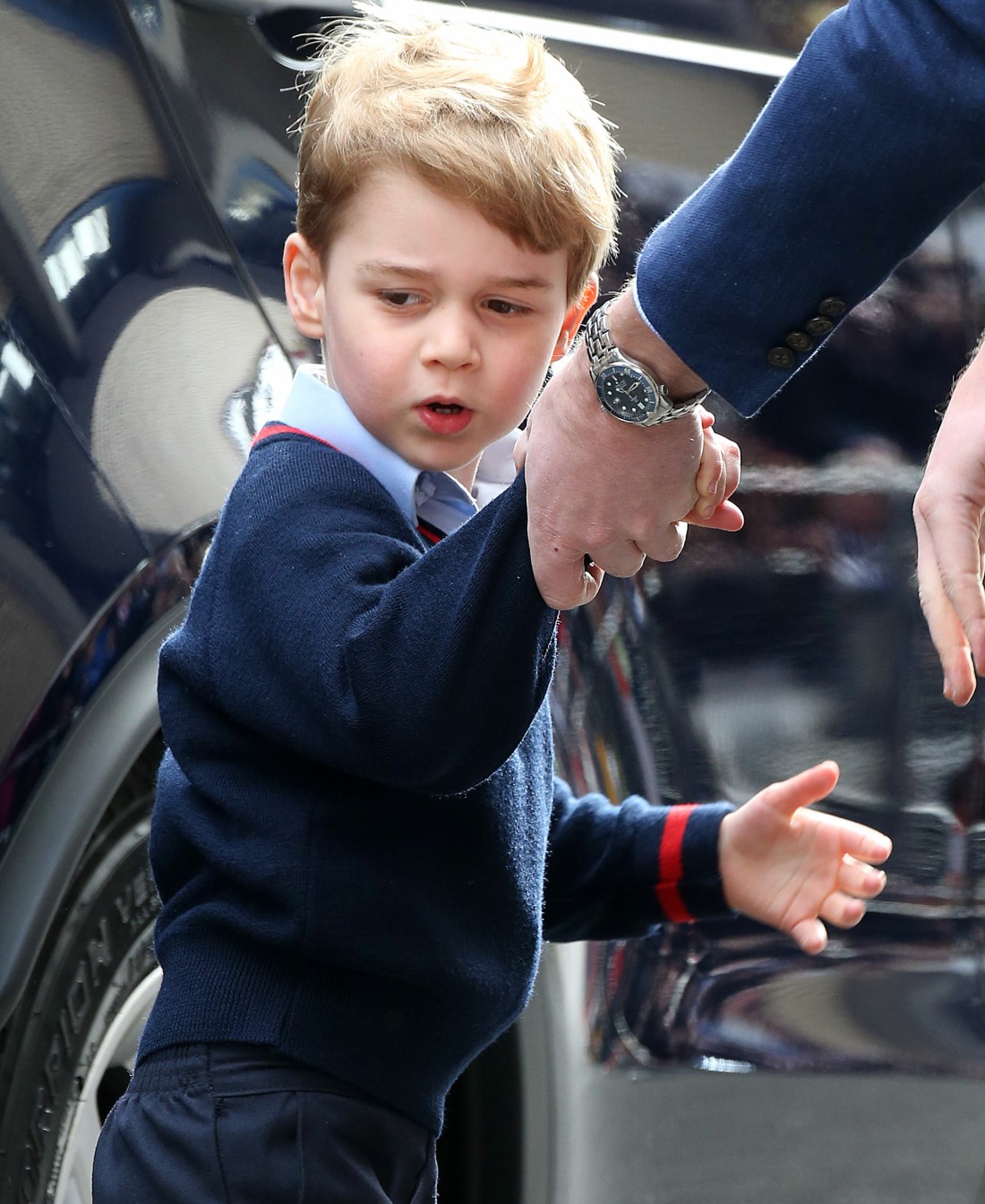
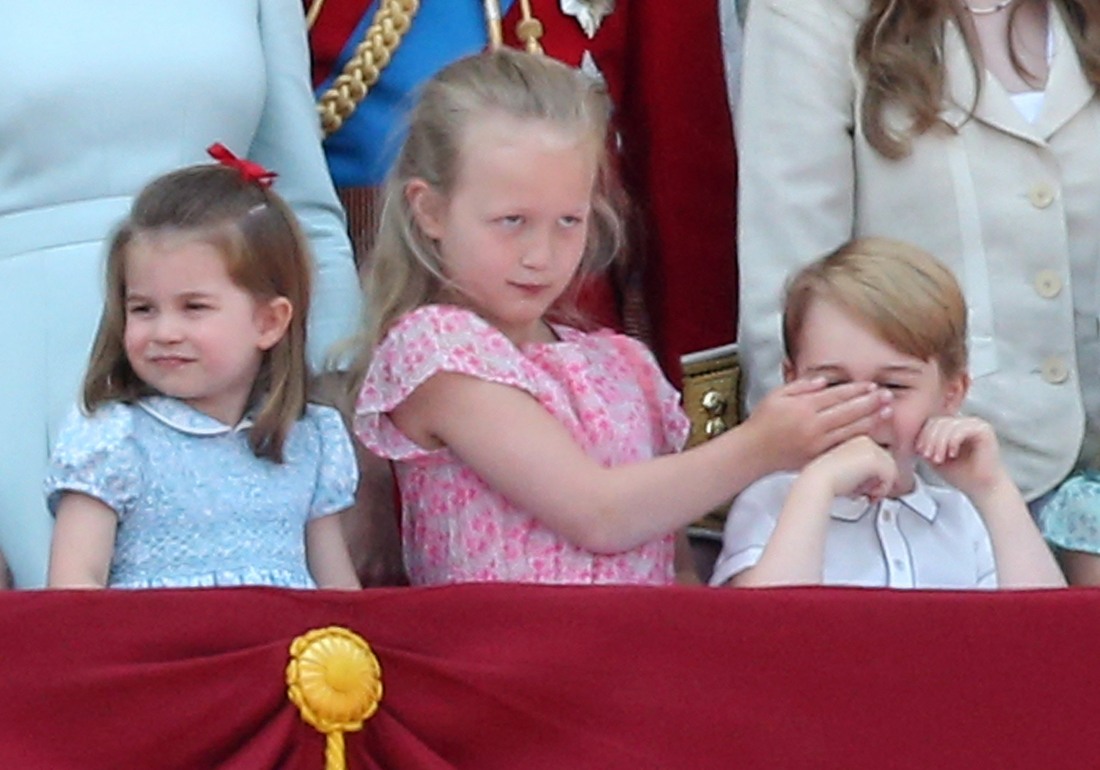
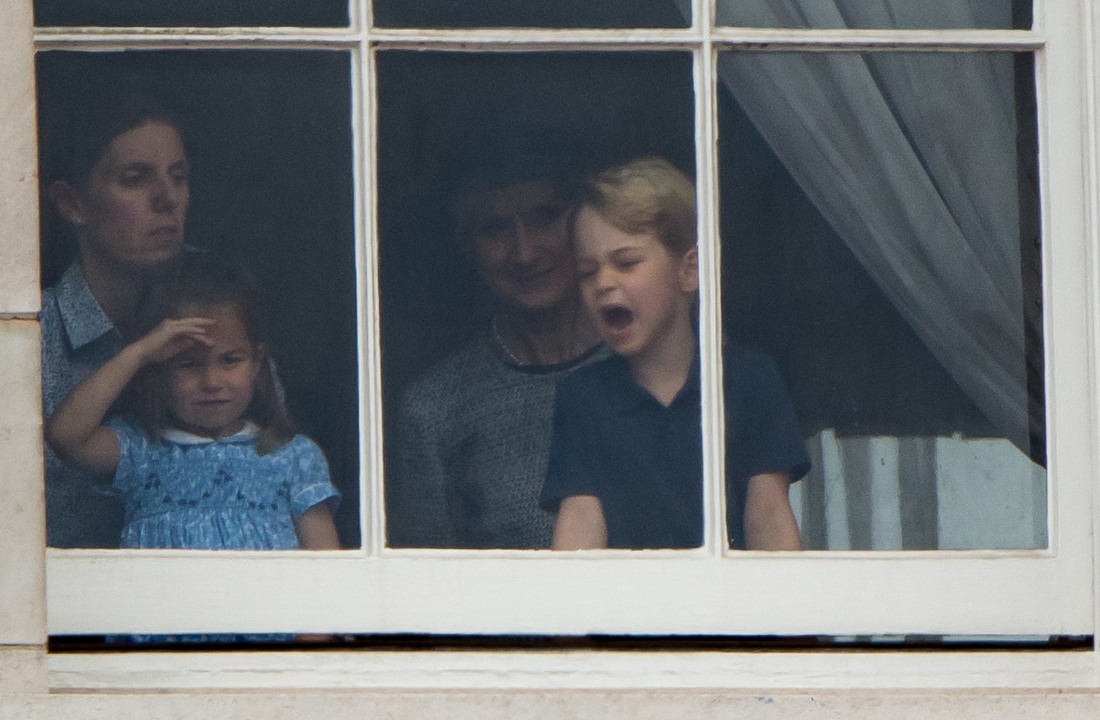







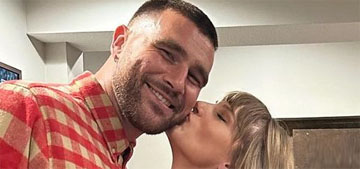
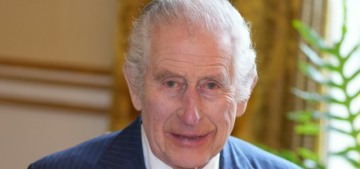
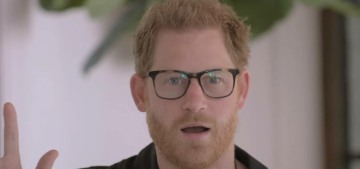




I am a teacher myself, and working with kids around 6, 7, 8 years old is as exhausting as gratifying. I’ve been teaching for 5 years now, and I can see myself doing it for 3 or 4 more years, but not longer than that. I’m already planning on getting a Master’s degree in order to teach to those that want to become teachers.
As for George, I’m only interested in him and Charlotte going back to school for two reasons: the adorable photos we will probably get, and the return of Kate
The burnout is real. I have a big family of teachers. I had planned to become one as well, but dropped out of university and pursued website development instead. They worked themselves to the bone. A couple were teaching in the 5-7 year old range, another taught 9/10 year olds. Another did Jr High then high school… the one teaching the youngest kids is switching into a special resource position to help the kids struggling with math I believe. The other two retired in their 50’s after about 30 something years of work. But things have changed SO much since when they started teaching that it was becoming a struggle. We’ve had a lot of effery happening in our province regarding education, and it’s just taking a major toll on teachers.
It’s sad to hear this. My niece started her first year of teaching. She graduated in January and did a semester of substitute teaching. She got the grade she wanted, second grade. But I can’t believe the hours she is putting in and how different it is from when I was a kid. She’s up at six. Gone by seven. She doesn’t get home until six. The school is only 20 minutes away. Then she works at night preparing for the next day. She works weekends. The school doesn’t even want them to use regular printouts and books. Everything seems to be created by the teachers according to the school’s direction and goals. More burden on them. She has a fairly large class which spreads her thin trying to give all the children the individual attention they need. It’s a diverse school, which she likes. But Constant meetings, emails. She has to keep track of every child, how they are getting home, what days that changes, children with challenges. I’m generalizing. But I had no idea teaching was like this. She is stressed. And she has a good class. One that can’t speak English at all and one who has meltdowns every day, but no ADHD children. I think because it’s her first year they put them in a more experienced teacher’s class. Although she has worked with ADHD children while interning and substitute teaching I
keep telling her it will be better next year. But these posts don’t give me hope. And I can’t believe all the money she has gone out of pocket creating her classroom and huge library for the children. God bless teachers.
I taught for 30 yrs., 2 yrs in K-2, then the rest in 3-4, mostly 3 (with put in a 5th gr..for two was…I was outa there like a bullet! Lol).
The first 5 yrs were fun, hard and exhausting. The next 5 hard and exhausting. The next 10 were horrible and gruelling, and by the last 10 I was hating to to go sleep the night before, because that meant waking up and starting all over the next day,,,,excruciating. Between the disrespect from kids, parents, AND administrators, lack of books and equipment to teach adequately (I spent $2-4 THOUSAND a year out of pocket for books, paper, pencils, crayon, KLEENEX…it was insane!). I had principals who told me to stop teaching times tables, as “they’ll always have a calculator” and “spelling wasn’t important; there’s always spell-check in a computer”, and “they use computers! Also, “Don’t waste time teaching handwriting! These were still all part of the 3rd gr curriculum! My question to that was what happens when they’re filling out a job application and have to do it there, in the office, by hand? And they don’t have a computer or calculator to figure out their salary? What then? She just looked hard at me, turned and left. FIRST TIME IN ALL OF MY CAREER TILL THAT POINT I didn’t receive a perfect score on my end of year evaluation.
I was so burned out, that when I got sick and had to retire early, that was the happiest day of my life! Even with a reduced pension, I am SO GLAD I’m not teaching any more.
Guys, that’s like my family. They’ve all had to shell out so much of their own money for supplies and extras. I know that they would spend money on students who couldn’t afford snacks/lunches. I know one in particular who would purchase magazines about specific things like guitars or whatever just to get some of the kids who struggled to read SOMETHING that interested them. One aunt would easily put in 60+ hours a week on an easy week. She’d be at work from 7ish am until 430, then doing ‘homework’ from 7:30-11. When teaching grade 7/8 she had students performing anywhere from a 2nd grade reading level, to a near college level. No support staff, and over 130 students per year between the classes.
Jayna – as awful as it is – I think the most important thing she can do is set boundaries. It’s so so hard. But she needs to set herself as clear boundaries as she can for how much extra she’s willing to do, and how much she can let herself worry. Way easier said than done, but she needs to make sure to focus on her own well-being to make sure that she’s living at least an okay life, and has time to enjoy it. One of my best friends is an elementary teacher – she’s not in a permanent position yet. But she’s on the french schoolboard and it’s a LOT different. Still the same kind of frustrations, but on a smaller scale, thankfully.
Jan90067 – I can’t blame you. And in some ways, I really wish I had continued my degree and gone into education – BUT I wish I’d taken a year of french immersion and worked to get into the french school board. That said – my ‘dream’ job was more in the line of guidance counseling, so I’d need to grab some masters education as well. All things said and done – I make a lot less money than I could have, have 4 years of student loans that are insane, but I get to leave my job -most of the time -at the door. There’s still terrible weeks, but it’s nothing like what teachers have to deal with. But I’m someone who has a hard time when it comes to worrying myself sick over other people, so there’s no way I’d have survived in counseling. This past winter we had a huge fight between provincial government and the school board. Collective bargaining was taken off the table, contracts were forced on staff, and the vindictive tyrant we have leading the province is doing anything he can to destroy unions. Before the forced contracts, the teachers voted to work to rule. The amount of abuse they got from the government and the public broke my heart. I viciously defended them whenever I had the chance and had overheard anyone saying anything crappy. And this was because they were working ONLY to what their contract dictates. It showed how far above and beyond every single one of these people went in their jobs. Parents outraged that activities stopped and they couldn’t dump their kids off super early and leave them super late. The whole thing was just such a mess of an aggressive smear campaigns against the people that are so necessary to our kids’ futures.
@ Jayna, it does get better, but it takes several years. The first 3 – 5 years are tough. If elementary teaching wasn’t such a female-dominated profession, the pay would be much higher considering the difficulty, dedication, and required skills. That said, I’m a second grade teacher, too, and it’s the best grade.
@ Jan90067, I hear you! Totally agree with you that kids need handwriting, math facts, and spelling. Oh my gosh. And yes, I have to spend so much of my own money every year. 🙁 Right now we are is trying to get a decent contract and the district isn’t negotiating in good faith. Send good thoughts, please!
I’ve been an elementary teacher for 20 years! As much as I like my job, I am seriously burned out. I have a masters in administration but don’t see myself go that route. I’m working on an art single subject credential so I can just focus on the one area I love- visual arts!
It’s alot to deal with, teaching has really changed so much in the last couple of years.
I’m a teacher too! I left when I had my son 9 years ago. I’m very active as a volunteer at their school, but I don’t know if I could back to teaching now. Having my own kids is exhausting, I don’t know how I would deal with having kids all day and then going home to my own resposibilities. I have considered maybe going back in an assistant role, or office position. I do love the school atmosphere.
My hats off to teachers doing an awesome job, it’s not an easy career. It does not IMO get the respect it deserves!
I’m a high school English teacher. I’m in my 23rd year of teaching. I’m not burned out, but I think it’s only because I’ve changed up what I’ve taught and where I’ve taught so much that it seems fresh. This year I’m all English electives, which is a nice break. Hoping I can keep this for a few more years.
I have my master’s, I have principal cert, and now I’m about to start a doctoral program, and I’m feeling a lot of pressure to move into administration. I’d rather stay in the classroom, but practical factors are involved: I need to make that pension higher in retirement. Momma doesn’t want to eat Meow Mix.
So I’m at a bit of a crossroads, but I’ve loved it. Some years more than others. 😉
I have no patience for the little ones. They’re cute, but you can keep them, LOL.
I, too, was a high school english teacher for 27 years. I just retired several years early. In my state, you need a Masters to teach so I have that and I have my Principal/Admin certificate but would never do that. Ugh.
I quit to become a substance abuse counselor and just started a MSW degree. I’m almost 57, but firmly believe no one is too old
to go back to school. I got my Masters at 40, my admin certificate at 52.
I agree with the other teacher – the first 10 years teaching was a joy, the next 10 were stressful and the last 7 were hell. I taught my
Last 14 years in a rural white school where racism and sexism flourished and I would get called to the office and reprimanded for correcting racist remarks that were factually untrue.
I took my diminished pension and finally got the hell out.
I think the big thing at private school for early ed is class size. My coworkers kid goes to private kindergarten and there are only 11 kids. That’s a world of difference from 30 (which is a big class! I think the largest k-6 class I was ever in had 24, and I went to public school)
Agreed, it’s class size.
My avg. class size was 34-38 in LA until they mandated it 20. But then they’d get around that by putting the special ed kids in for “mainstream hours” which was all day, short one, maybe two hrs. max., when they were in speech, or occupational therapy. It was allowed because the special ed teacher carried the kids on HER roster. So you were usually having up to 30 kids in your class a day anyway.
Exactly this. I was in a private school for elementary (ages 6-11) and we had tiny class sizes compared to my friends in the public system. When I hit junior high (middle school I guess?) I moved to the public system because my parents could no longer afford private school , where the teachers were just as good (if not better), but class sizes were much larger thus you just didn’t get the same one-on-one time for learning. I really believe the first 6 years in a private school gave me a leg up on my classmates later on, because of this.
Note: In this private school, the focus was language as I was in French immersion. I started very young and because of it my french was, and still is, excellent. It really does help to start young
I went to French school where all subjects were in French except English class. Some kids had francophone parents and others didn’t but since everything was in French from kindergarten on it didn’t make a difference. Everyone is fluent. Simply learning words in a language won’t help people remember it much later on. In Ontario all kids have to take some amount of French in grade school and high school but the ones who simply took one class of it per year end up forgetting it once they leave high school. Immersion is a must in order to be fluent.
I agree with this. I’m public school K-12, and get a bit defensive because I think I learned as much as I put into it, but I agree that classroom sizes and more attention in formative years gives a child the chance to be years ahead, nurturing different areas of the brain. I also agree that immersion is huge in becoming really fluent in a language. Pick it up at George’s age, he’ll be a native speaker if he wants.
My dad is a high school teacher, still going although he could retire, and he’s been burned out. It’s hard job.
This. The biggest difference in education is how much time a teacher can spend on individual students which is a lot more if you can afford smaller classes.
+1
There are a few reasons to send young kids to private school and class size is a huge one. My daughter’s private school kindergarten class had 11 kids in it. There was a head teacher and an assistant. The public kindergarten around the corner had 29 kids and only one adult in the room for most of the day.
The other big reason was standardized testing. Where we live, it starts in 3rd grade. The 4th grade tests essentially determine where kids go to middle school. They start teaching kids to fill in bubble sheets in kindergarten. That simply doesn’t happen in the private schools.
And they started teaching her Spanish in kindergarten – numbers, letters, colors, nursery rhymes, etc. At 14, she has travelled in Spanish speaking countries and been able to communicate in Spanish with minimal fuss. The public schools generally do not introduce foreign languages until middle school.
@Liz
ALL OF THIS.
I have developed a renewed respect and admiration for teachers now I have teenagers. I don’t know how they do it.
Bring on the cute back to school pictures.
I don’t agree. With the right approach, you can teach kids amazing stuff. Introducing coding to a 5yo is a great idea, because coding is about a certain kind of logic, which you can explain to a kid in a fun way. I work with 3-10 y.olds in a children’s choir, and it’s unimaginable what you can teach very little kids. Wish I had George’s opportunities!
As someone who spends a considerable amount of time writing/editing/working with php, javascript, html, css, etc etc (I’m not even nearly as deep into it as people who are programmers ) … it’s way easier to teach kids the kind of logic early on. Once you’re an adult and used to thinking a certain way, it’s harder to wrap your head around what comes off as backwards logic a lot of the time. I started dabbling in web development around 12/13 years old, I wish I’d embraced it even more back then.
Here’s a bonus coding logic joke, just to further the point of how having normal logic can hinder coding logic haha:
A wife asks her husband, a programmer, “Could you please go shopping for me and buy one carton of milk, and if they have eggs, get 6?”
A short time later the husband comes back with 6 cartons of milk and his wife asks, “Why did you buy 6 cartons of milk?”
He replies, “They had eggs.”
Coding – the language of Dad jokes.
Here in Ireland coding is being pushed for young kids and I think it is a great idea. There are Coder Dojo’s close to us and my nephews attend, best of all it is free so all kids can have access.
Zapp Brannigan, you’re in Ireland?! Me too! I’ve admired your username from afar for a little while so the fact that you’re a local is pretty cool.
Yeah BaBaDook, another Irish person on here. Your name frightens the bejaysus out of me, that film was great.
My friend’s grandson is learning coding in kindergarten, here in BC.
Completely with you. Developmentally this age is one of the best times to start teaching children basically anything — their brains are on high alert. Whether it’s coding, ballet, music, languages, what have you you’re not only giving them skills now but laying the foundations of future learning.
Yes, they can learn how to devise simple programs to move a toy, for example. It’s just breaking things down into simple steps. Not really beyond a five year old if taught correctly.
I do think they need more daily time with French if they want it to stick. Even 15 minutes a day would be better than half an hour per week. One tactic that an American public school used successfullg years ago was to have regular subjects taught in different languages. I think they might have used English, Spanish, and Vietnamese (based on the languages the kids were using at home). Turned out that it wasn’t hard for kids to pick up the right terms in English even though taught in another language.
Agreed. My kids have been in the public system in Brooklyn since they were 4, and that is the age they start teaching the basic ideas of coding. It isn’t javascript but it is building a foundation for a language they need. My kids also started learning French in kindergarten (age 5), and are near fluent at 7 and 9. So there are amazing things kids can learn at very early ages if schools/teachers use scaffolding to help build skills up from easy to hard.
About 5 yrs. ago, in LA Unified they started introducing coding to Kindergarteners. Seems to be fine, as most have been on a computer for years by then.
When I was a kid in elementary school (during the Dinosaur years), taking a 2nd language was mandatory in grades 3-8 (my school was K-8, then HS 9-12). Anyway, we had language class every day. I took French. By 8th grade, I was so fluent, I was even dreaming in French. I got cocky, and decided to take Spanish in high school. Got fluent in that easily (it is a much easier language to learn than French, for me, anyway). Then I got *really* cocky, and took another year of French along with my Spanish in my senior year. Welllllll, no. lol. I spoke French in my Spanish class, and Spanish in my French class, and Frangish inbetween. No one knew what the hell I was saying! lol.
Now, decades later, I remember a spattering of French phrases, but have been scoffed at for trying to speak it in France on vacation lol. My Spanish is a little better than my French, I can be understood, but it’s used here in L.A..
Agree with you. It’s not a waste. They really soak it all up when they’re young, and even if they don’t become a programmer or a prima ballerina, the exposure and experience is worth it.
And if I’m paying that much for private school for my 5 year old, there BETTER be extras like that!
I started out wanting to teach. To get a good taste of it I became a substitute teacher and was given jobs when teachers went on maternity leave. After a year, I realized the job wasn’t for me. The parents have become one of the biggest problems, here in the US. God bless these men and women for their work. I couldn’t do it.
I have teachers in my family. None of them criticize the students. They say kids and teenagers are the same. The difference today is the parents, that are cocky, disrespectfull, cover when their kids do something wrong and treat teachers as if they are their serves. These are just a few of their complaints.
my parents said this alot before they retired – they couldn’t get over the changes in the parents over their teaching careers, a huge lack of respect for teachers, always taking their kids’ side , etc etc.
T, so true. My sister in law retired from her job as a school principal and she said the parents had become awful and beyond entitled. She said it’s gotten so bad that if a kid gets a B, an entitled parent will be screaming about it. She said parents look down on teachers and think they know more than the lowly teacher. And this from a magnet school where you get in via lottery.
Shoutout to all the eductaors out there! Seriously, you rock^^
Thank you!! As I said is exhausting, but I don’t know, I love my job. And when I see the kids excited to see me .. it makes my heart burst with happiness.
At the same time, it’s so frustrating when people complain that we work “only” 4 or 5 hours in the day, when the truth is that we do so much work at home… We grade homework and exams on Sundays!!
I went to private elementary school (in Quebec, they are govt subsidized so it was def not 20 000$!!) we took ballet and Judo. It was awesome. My parents were public school teachers – much respect to educators, they do such important work and don’t get enough respect for it!!
To all the amazing, inspirational, hardworking teachers in my life I take my hat off to you. As for the rest – too bad you didn’t major in something else.
Have a great year George! Soak up all of the wonder and joy you’re able to 🙂
I can believe he is learning these things but clearly just at a basic level. I’m sure he will have a good time. Reading 10 minutes a night is no big deal. It’s fun to see how much they learn in the beginning. My oldest starts first grade next week and I cant believe he’s the kid who went to K last year with only 10-15 sight words.
Lucky kid! Coding, like other languages, really, is great to start kids on early.
It’s ALL down to class size. The larger the class, the more fraught and frenetic it is, and the greater the likelihood that the preternaturally gifted will be ignored.
In my own case, I was already three years ahead of my peer group when I started at a state infant’s school. My reading level was that of an eight year old and the teachers either did not know what to do with me, punished me for racing ahead of the class which was still getting to grips with shoelace-tying, or ignoring me. It wasn’t until I got a full scholarship for a good public (private) school that I was remotely intellectually stretched. Small wonder that so much potential is being wasted!
-And, @kaiser, it’s getting progressively worse in the UK: a significant and growing number of children over the age of four are turning up unable to use a knife and fork; nor have they been potty trained, as certain parents believe it is the teacher’s job to do so. Much of lessons, therefore, is spent changing four year olds’ nappies and cleaning up effluence.
Actually, high quality early care and education is where you get your biggest payoff, investment-wise. The early years are absolutely critical.
I totally agree Kaiser. How are they going to fit all that in with nap times, outdoor fun, and and just messing around? Coding for 5 year-olds?
Nap times?! In England we’ve never had nap times lol. I currently teach reception (kindergarten), but have also taught year 1 (the year George is going into). Let me tell you…it’s so frustrating how the goverment has basically taken away all the fun of teaching. Children are expected to learn A LOT. English, Phonics, Maths, Science, History, Geography, Computing, Art, Music, PE, RE, French, PSHE and Topic!! It’s a lot to fit in on a weekly basis. Everything the private school teaches is the same in public schools (except for the Ballet and Drama). The biggest difference is that in a private school the class sizes are very small (10 – 12 children). Normal class sizes for public schools are 30. Try teaching 30 children aged 5-6 all that stuff…and my husband wonders why I get exhausted 😂. Still, I wouldn’t change my job for the world!
My 11-plus class – in 1959, had 44 in the class!
The public vs. private debate is so fraught in America, and largely because it’s turned into a haves and a have-nots situation. I just read an interesting article that discussed the role of Catholic/parochial schools in this. From the 40’s to the 80’s, most “private” schools were Catholic schools, and they were still affordable by the middle class because they were subsidized by the churches. Now, most private schools are either mainline Christian or just regular private, astronomically expensive, and even Catholic school (while cheaper than other private schools) is out of reach for most of the middle class. So, now, it’s basically only wealthy parents who can opt their kids out of public school.
And I feel, sadly, that though much of what makes a great private school great can be implemented into public schools, it will never happen because we insist on teaching to tests. We ignore all evidence to the contrary and continue to do what we know doesn’t work to create innovative, curious thinkers. It’s disappointing to see the class line drawn for something like this (though I’ve seen wonderful examples of initiatives taken in underserved communities). Small, important, inexpensive measures could be taken to close the gap with early childhood education, particularly.
My 4 year old took a coding class and she Loved it. She really did learn enough to put together an R2 D2 robot. It’s a language. The sooner you learn it the better it is.
Is he going into the 1st grade or is he going into Kindergarten? Because I don’t recall there being nap time beyond Kindergarten. Although, I wouldn’t mind a nap time. I teach at an all-boys high school and they suck the life out of me by noon.
School starts earlier in the UK. Reception is age 4, and year 1, which George is going into, is age 5. There’s no nap time at any time in UK primary schools, however.
It isn’t just the private schools. Starting this year the public schools around me are introducing coding to third graders and above. Also, daily yoga and meditation will be taught in the elementary schools.
I took Chinese as an 8 year old. I only know how to say Xiexie.
Eh, I think there’s a huge difference between public and private schools, even for very young kids. Given that the US has started pressuring very young kids into long term desk sitting and reading at very young ages (and thus, seeing how severely limiting outdoor time and free play wreaks havoc on behavior and learning), I will always (within my means) opt for the smaller class sizes in the schools where my kid will learn how to be a good person, a conflict resolver on the playground, a carer for their community before I opt for rote memorization and sitting long and still like a good little boy/girl in public school. We’ve changed the face of education-in this country, at least-and we’re paying the price with children who are bored, not curious, burnt out and isolated in small rooms.
I feel like it’s the opposite, that great early education is more important. I was a stay at home mom and have recently started working at walmart (fml) so I can pay for my kids to go to montessori school. My daughter has started kindergarten and was able to get a scholarship (almost covers her tuition) because she has developmental delays and my son is only two, but he goes there as well. I believe the way the way they teach is absolutely, hands down a thousand times better than regular public school. I feel like my daughter would be left behind in the public system and the way they teach in her school, hands on in a relaxed environment is wonderful for her. No desks, freedom to choose what subjects and lessons she wants to focus on. Just the equipment and way they teach is amazing. I wish every child could go to montessori school. I definitely feel that this will help her and my son so much more in the later years. This is going to be the foundation of their education and I believe it will be an asset for them. My goal is to keep them in montessori school for their elementary years. I will work as many shitty jobs as I need or go into debt to keep them in their school. My daughter has improved so much and the things she’s already learning are phenomenal.
ITA 100% Public schools in the US are awful at the elementary stage. I have 3 kids and my eldest started private school in PreK4. By 3rd grade he was light years ahead of our neighbors children. He writes in cursive, plays piano, and speaks conversational Spanish/French. In public school they no longer teach these subjects until highschool. And as a parent and former teacher, I cannot stress enough the importance of small classes at the elementary level. 3-9 years old these kida are sponges. My son was multilingual, a pianist and coding by 3rd. He sstarted public recently and he is way ahead of his peers.
Also, we pay $20k a year for private and are very very middle class. So I’m surprised George is at such an affordable school.
Say what you will about the price of the school, but it’s really not that insane? I live in a large city and a standard daycare here runs at $14,000 a year. So $26k American a year for a fancy schamncy pre-k “school” really doesn’t seem like much of a stretch.
He is so cute. I know a thing or two about kids…..Miss Charlotte is going to take over that palace, wait and see, sitting there between two brothers. Love that girlie girl in disguise!
Just what he needs for his role as future king…?!
“Oh yah I learned ballet at the expense of the taxpayer yahh”
Oh dear!
What do you want a 5 year old child to learn?
I want his parents to work much harder and I have no time for waste at our expense, but he’s a child who needs to go to school, and it’s just not possible, as a matter of security, to send him to the local state primary school. It seems like a nice school that is not too ostentatious.
I attended a fancy ass private all girl school from kindergarten to college (high school) By the time I was 5 I could speak 2 languages besides my own, had clear mathematical knowledge, I was open to culture and religions, was being taught the scientific method, etc.
This solid foundation at such a young age, and everything else my education provided me with (plus my hard work, because it wasn’t easy), gave me an immense advantage at Uni.
My school now teaches basic coding to 2 year olds. Coding will be the new Universal language, displacing english. Kids need to get on that train. People my age can’t even find the station.
5 year olds take ballet outside of school all the time there’s no difference except it’s at school. I did my little gymnastics as a young child. I hope I make enough money so my kids can go to private school.
I can see it now: Tonight, in the role of Prince Siegfried in “Swan Lake” – Prince George of Cambridge.
Talk about firsts . . .
Nah disagree – kids are sponges – perfect age to expand their brains.
Languages are excellent to start learning at that age if the lessons continue. So much easier to learn and it becomes second nature rather than having to force an adult brain to learn new grammar constructs and verb conjugations.
Loads of kids start dance lessons at 4 or 5. It starts basic and then grows more complex.
You would be absolutely amazed by what 5-year-olds can do! I taught in a mixed-aged classroom (3-6) and was constantly in awe of the leap between 3 to 4 and what mature, absorbent learners the 5 year-olds were. They can learn basic robots and basic code, easily, and have definitely stopped eating glue!